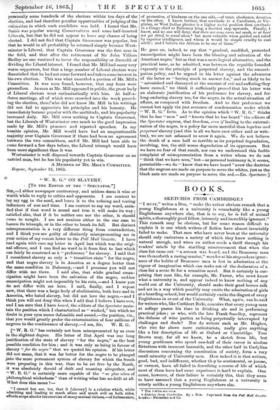0 " W. R. G." ON SLAVERY.
. [To THE EDITOR OF THE " SPECTATOR."] SIR,—I abhor newspaper controversy, and seldom deem it wise or worth while to reply to critics and opponents. I am content to lay my egg in the sand, and leave it to the refining and testing influences of sun and time. I am content to say my word, satis- fied that if that word is sound and true it will make its way ; satisfied also, that if it be neither one nor the other, it should come to naught. I am not anxious either in the one case to hasten its triumph, or in the other to break its fall. But distinct misrepresentation is a very different thing from contradiction, and I think you are guilty of distinctly misrepresenting me in your notice of my recent letter to the Pall Mall Gazette. I have read again with care my letter in April last which was the origi- nal offence, and I can find no word in it from first to last which can fairly be construed as it " preference " for slavery. I said that I considered slavery as only a " transition state" for the negro, and that negro slavery is in America as a degree better than the same condition in Dahomey, —and I presume you will not differ with me there. I said also, that while gradual eman- cipation might have been the salvation of the negro, sudden emancipation might not impossibly be his ruin,—and I know you do not differ with me here. I said, finally, and I repeat now, that there was a large body of abolitionists, both here and in America, who hated slavery, but did not love the negro,—and I think you will not deny this when I add that I believe I have seen, and I am sure that I have heard, the editors of the Spectator main- tain the position which I characterized as " wicked," but which no doubt in your eyes seems defensible and sound,—the position, viz., that you would greatly prefer the extermination of four millions of negro_ es to the continuance of slavery.—I am, Sir, W. R. G.
[" W. R. G." has certainly not been misrepresented by us even in the slightest degree. His letter of 21st April was one long justification of the state of slavery "for the negro," as the best possible condition for him ; and it was only as being in favour of slavery "for the negro" that we quoted his opinion. If his letter did not mean, that it was far better for the negro to be plunged cinto the more permanent system of slavery for which the South were 'preparing in this war, than to be set free by the North, it was absolutely devoid of drift and meaning altogether, and " W. R. G." is certainly more capable of the "ne plus ultra of philosophical wickedness" than of writing what has no drift at all. What does this mean?- "Icannot but see, too, that it [slavery] is a relation which, while admitting and leading to much abuse and much evil on both aides, affords scope alsofor the exercise of many mutual virtues,—of forbearance, of protection, of kindness on the one side,—of trust, obedience, devotion on the other. I know, further, that servitude to a Carolinian, or Vir- ginian, or West Indian planter is a higher Social position then servitude to a Congo chief or Dahomey king, a decided step upwards. Finally, I know, and no one will deny, that there are &Mad races not made, or at least not yet fitted, to stand alone,* but moat valuable when guided and rated by superior intelligence, and whom it would be simple cruelty to cast adrift ; and I believe the African to be one of them."
He goes on, indeed, to say that "gradual, modified, protected emancipation might have been the blessing and salvation of the American negro," but as that was a mere logical alternative, and the practical issue, as he admitted, was between the republic founded expressly on the principle of perpetual slavery, and the emanci- pation policy, and he argued in his letter against the advocates of the latter as " haying much to answer for," and as likely to be " astonished and diamayed at the amount of evil and suffering they have caused," we think it sufficiently proved that his letter was an elaborate justification of his preference for slavery, and for long-enduring slavery too, for the negro, in the actual situation of affairs, as compared with freedom. And to that preference we cannot but apply the just sentence of condemnation under which " W. R. G." frets. As to the opinion which " W. R. G." thinks that he has " seen " and "knows that he has heard" the editors of the Spectator express, that freedom, even if leading to the extermi- nation of the negro, is a policy far more merciful than hopeless and perpetual slavery (and this is all we have ever either said or writ- ten), we are not ashamed to avow it again. We do not believe the death of a race half so terrible as its perpetual degradation, involving, too, the still worse degradation of its oppressors. But we have no fear of that result, nor can we understand this feeble complaint of misrepresentation from a writer whom we do not " think that we have seen," but—as personal testimony is, it seems, permissible—we do " know that we have heard "avow the doctrine that the negroes are made on purpose to serve the whites, just as the black ants are made on purpose to serve the red.—En. Spectator.}






























 Previous page
Previous page